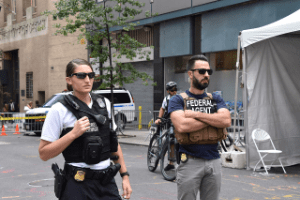What is a 1811 Special Agent?
An 1811 special agent is a job classification code in the federal government. Any federal agency that has special agents. Special agents working for federal law enforcement agencies are going to be classified as an 1811, which is the job series code. Additionally, their title will be criminal investigator, but their working title will be special agent. So generally, their credentials will say Special Agent. However, their actual title is criminal investigator.
What are the Requirements?
 In general, the requirements to be an 1811 special agent are going to be a four-year degree –it does not have to be a degree in criminal justice or law enforcement, it can really be any type of degree.(See: Best Majors for Law Enforcement) The minimum age to become a special agent is generally going to be 21 years of age, although there are some agencies that have it at 23. The maximum age at which you can start off being a special agent is 37 years old. There are some exceptions for certain types of military service.
In general, the requirements to be an 1811 special agent are going to be a four-year degree –it does not have to be a degree in criminal justice or law enforcement, it can really be any type of degree.(See: Best Majors for Law Enforcement) The minimum age to become a special agent is generally going to be 21 years of age, although there are some agencies that have it at 23. The maximum age at which you can start off being a special agent is 37 years old. There are some exceptions for certain types of military service.
The reason why there is that maximum starting age of 37 is for retirement. For most federal criminal investigator jobs, you must retire by the time you are 57 years old. So, in order to have 20 years of service, you would need to start by the time that you are 37 years old, some people get they think it has to do with you know physical abilities. It’s just so that you can get the maximum retirement benefits that you would be entitled to.
There is another qualification, which is called “Outstanding Scholar”. This will qualify you at a higher starting rate. What the “Outstanding Scholar” Program is, that if you have a 3.0 GPA or a 3.5 GPA in your major, then you would qualify for the “Outstanding Scholar” Program. You would start one level higher than just with a four-year degree.
The Hiring Process
For federal law enforcement Special Agent positions, it is always going to start with a job announcement. The job announcement will list all the requirements, the educational requirements, any experience with the other requirements for that position. There will be an open period and a closing period. It is vital to get all of your information and all the documents in by the closing period.
Often the closing periods are very short, they can be as short as only open for a few days, a week or a couple of weeks. Often, there will be required documentation that needs to be included, along with your application. If something is missing are not filled out completely, you will usually not hear back from the agency or the hiring authority that you’re missing something, you just will not move on.
The applications will be rated to see who meets the minimum requirements for that position. Those who do will be invited to take any written exam–if in fact, the position has a written exam. They will also be invited for an oral board interview. If there’s a written exam, sometimes just those who pass a written exam or have a certain score will move on. For agencies that do not have a written exam, the applications will be rated for those who exceed the qualifications, and those people will be invited to an interview. They will do at least one round of or oral board interviews, sometimes two. Then, those applicants will be put on a list based on their score and the agency will move down that list.
Once they select an applicant for potential hire, they will do a background investigation on that individual. They will then move on to doing a medical examination if it appears that they’ll be hiring that particular person. After that, they may offer them a conditional offer of employment. Conditional offer of employment, meaning they have the job if they pass the additional tests, if any. The additional tests can be a psychological, it can have polygraph questions. That entire process can take anywhere, on the short end, from four to six months; on the long end, it can take nine months to a year.
It’s very important to understand that it can be a lengthy process. But if this is something that somebody wants to be, they should be persistent and stay with it. Learn more about 1811 SPECIAL AGENT Test Prep Course
Background to Become a Special Agent
For any 1811 special agent job, you’re going to need a background investigation in order to get a clearance. Most of these special agent positions will require a top-secret clearance. Some may simply require secret clearance, and these are going to be full background investigations, where not only will they run criminal history, run your fingerprints, threats through NCIC, but they will also interview former neighbors, roommates, professors to find out if you are appropriate for the job that you have applied. That can take a while. Sometimes when those are done, there will be a preliminary clearance given to you and then they’ll continue doing that after you’re hired. Other times, that will all be done prior to being hired.
What are Inspectors General?

If you look at the Department of Justice’s Office of Inspector General. Underneath the Department of Justice are several law enforcement agencies, which will investigate the criminal activity that takes place in their jurisdiction. However, under some departments¬¬–as an example, in the US Department of Transportation, where there are very few criminal investigative agencies. Therefore, in an agency like that, the Office of Inspector General for the Department of Transportation, they, in addition to looking out for fraud, waste and abuse, they can investigate criminal activity that violates any of the statutes related to the US Department of Transportation.
So, when looking at which inspector general offices you’re interested in applying with, it really can vary quite dramatically.
What Training do Special Agents Receive?
So, depending upon the agency, most special agents will go to a criminal investigator school at the Federal Law Enforcement Training Center in Brunswick, Georgia, commonly referred to as let’s see, FLETC, they will go through the criminal investigators school, and then after that, they will go through a specialized program for their agency. So, typically, Secret Service; Alcohol, Tobacco and Firearms; they will go through specialized training after that, depending on which agency they are with.
Difference Between a Special Agent and a Detective?
Most people are familiar with the law enforcement jobs of detectives that work in police departments or sheriff’s offices. Especially the homicide detectives. For agents, they’re very similar to a detective in the sense that they conduct criminal investigations, they have full law enforcement authority. What’s unique about the federal system is that special agents are an entry level position. If you want to become a detective with the police department, you have to work your way up from patrol; it can take several years to get to the position where you may qualify for detective. However, in the federal system, all Special Agent positions are entry level. They do not require prior law enforcement experience. Therefore, people move into those jobs as a starting off point in the federal government.
Where are 1811 Special Agent jobs?

Often when somebody is hired as a special agent, they sign a mobility agreement. What that agreement is, is that you agree that you will relocate depending upon the needs of the agency. Therefore, you may be hired for a position in Atlanta, Georgia, but at some point, in time you may be transferred to Dallas or Los Angeles. That is part of the agreement that you signed when you started on. It is not unusual for people in their federal law enforcement career as a special agent to work for two agencies during their career, often three agencies during their career
From Police Officer to Special Agent
For people who are working as a police officer, or a deputy sheriff that are interested in becoming a special agent, you can apply right away. Experience is not required to apply for an entry level special agent or 1811 position. The experience that will give you an advantage is investigative experience rather than patrolling experience. If somebody is working as a patrol officer, or deputy sheriff, and they’re interested in becoming a special agent, there really isn’t a reason to wait for applying it’s something that they would qualify for right away as long as they meet the minimum qualifications and they can start pursuing that career path.
Special Agent Test Prep
For 1811 Special Agent job openings, each agency including the FBI, Secret Service, HSI, DEA, and ATF, all use different exams, and they are all very challenging compared to other law enforcement entry exams. Depending upon which agency are are applying with, it is important to prepare specifically for that agencies’ written exam.
There will always be an oral board interview as part of the hiring process. So regardless of whether or not the agency has a written exam or not, it’s vital to practice extensively for the oral board interview because the oral board interview will count for just as much if not more than the written exam, if the agency has that.
A lot of people presume that because they think they’re a good candidate, they don’t need to practice for the oral board interview. That is not the case at all. Preparation is key. It is very obvious when a candidate person that prepared for the board interview.
How to Prepare for the Interview

All federal law enforcement agencies have different specialties in what they do. That’s one of the big differences between federal law enforcement agencies and local police or sheriff’s office. Therefore, it is important to know the mission of the agency, the types of crimes that they investigate, where their offices are, and maybe even some of the main issues affecting those agencies so that you can talk about them.
What they’re really looking for is your ability to communicate and articulate yourself and what your reasoning process is; can you communicate effectively? Lastly, you should be able to give a summary of why you think you are a good candidate for that position.
Preparation really is key. There may be a follow up interview after the initial interview, and one of the things that they’re going to look at is if you have prepared for this oral board interview.
Learn more about 1811 SPECIAL AGENT Test Prep Course

 Joseph Libowsky,
Joseph Libowsky,